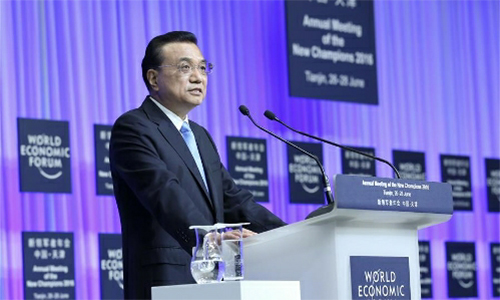Premier Li urges economic unity after Brexit
Relocating employees key to solving overcapacity: premier

Chinese Premier Li Keqiang addresses the opening ceremony of the Annual Meeting of the New Champions 2016, or Summer Davos Forum, in Tianjin, north China, June 27, 2016. (Xinhua)
China's economy will not experience a hard landing despite the uncertainty complicated by Britain's referendum to leave the European Union, Chinese Premier Li Keqiang said on Monday, calling for joint efforts to face the challenges.
"Brexit's impact on world financial markets is clear, adding uncertainties to the world economy," said Li at the annual meeting of New Champions 2016, dubbed "Summer Davos," in the port city of Tianjin. "To push for world economic recovery and seek each country's growth, we must jointly face the challenges."
Li said all countries should "foster competition, support innovation and open further, in a concerted effort to push for a robust, sustainable and balanced global economic growth."
In China's case, with the country's new economy powering ahead, its economy won't be headed for a hard landing, although the foundation of a stable economy has been shaken by the complicated international environment as well as the country's "long-accumulated and deep-rooted" problems, the premier stressed.
Li cited waning demand, sluggish private investments, risks in the financial arena and excess capacity among the indications of heavy downward pressure on the economy.
"We must recognize that efforts to remake the economy are unlikely to materialize in the next year or the near future, but that won't damage investor confidence," Zhang Jinrong, vice president for the Greater China region at ManpowerGroup, a US-based multinational human resources consulting firm, said in an interview with the Global Times.
Worth noting is that China's leadership has addressed the economy's growth woes in a frank and sober yet optimistic fashion, thus restoring investor confidence, Zhang said.
"The key to cutting overcapacity is to figure out where to relocate affected employees," Li said, noting that both the central and local governments will offer the necessary support to help redistribute and resettle affected workers.
Li said China's overall government debt ratio stands at around 40 percent, while the central government debt ratio is around 16 percent, which means there's still leeway for the country's proactive fiscal policy.
Also, the country will gradually cut companies' leverage ratios, among wide-ranging efforts to put the economy back on the road to recovery, he stated.
Echoing the premier's remarks, Peking University professor Huang Yiping, a member of the monetary policy committee of China's central bank, told a Summer Davos session Monday that "the central government has to shoulder some responsibility if the government wants to lower the corporate sector's leverage ratio."
Wider restructuring efforts, including a State sector overhaul, "won't happen overnight," according to Huang.
While short-term fluctuations in traditional sector data might still concern some market watchers, China's new economy will inject hope in the overall economy.
"The new dynamics have been playing an increasingly bigger role in ensuring employment, raising income, spurring economic transition and upgrades," Li said. He said he believes the new economy is destined to power the nation's future growth.
Citing the enormous opportunities to be tapped in the economy's transition, industry watchers said attention must be given to the uniqueness of the Internet-based new economy.
"The property, steel and coal sectors can no longer serve as the Chinese economy's locomotive, which is envisioned to be powered by the new economy," Zhou Hang, CEO of Yidao, one of the country's major car-hailing service providers, told the Global Times on Monday.
The new economy also has its own challenges, notably the difficulty in achieving profitability in the short term, since investing in the new economy initially requires massive capital, according to Zhou.
It's advisable that the government should give sufficient leeway to businesses engaging in the new economy, otherwise, it might risk strangling innovation, said Yao Jinbo, CEO of 58.com, China's largest classifieds site.
Wang Cong and Huang Ge contributed to this story
Newspaper headline: Premier Li urges unity after Brexit